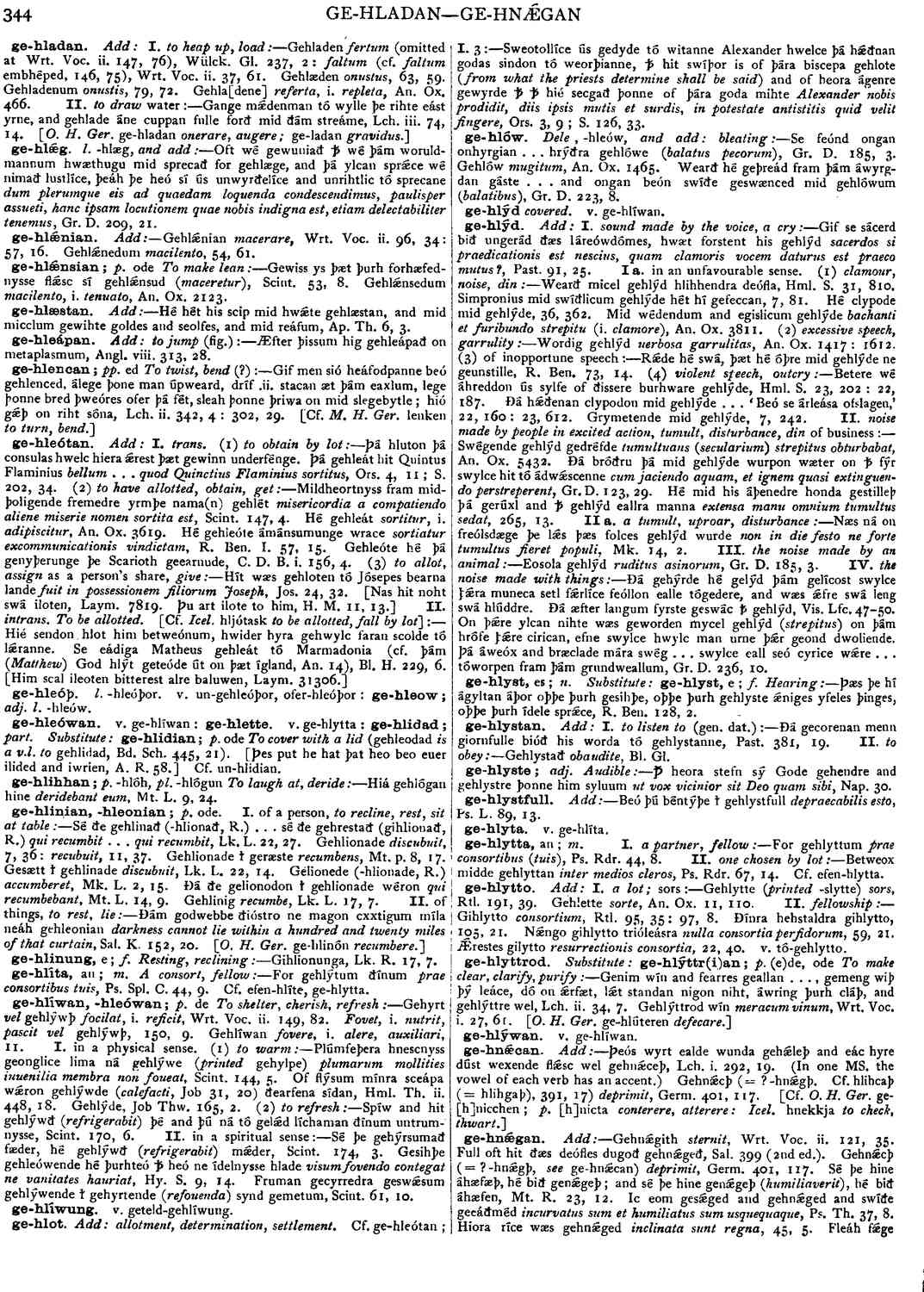ge-hlýd
-
Gif se sácerd bið ungerád ðæs láreówdórnes, hwæt forstent his gehlýd
sacerdos si praedicationis est nescins, quam clamoris vocem daturus est praeco mutus?
,- Past. 91, 25.
- I a. in an unfavourable sense.
- Wearð micel gehlýd hlihhendra deófla. Hml. S. 31, 810.
-
Simpronius mid swíðlicum gehlýde hét hí gefeccan,
- 7, 81.
-
Hé clypode mid gehlýde,
- 36, 362.
-
Mid wédendum and egislicum gehlýde
bachanti et furibundo strepitu (i. clamore ),
- An. Ox. 3811.
-
Wordig gehlýd
uerbosa garrulitas
,- An. Ox. 1417 : 1612.
-
Rǽde hé swá, þæt hé óþre mid gehlýde ne geunstille,
- R. Ben. 73, 14.
-
Betere wé áhreddon ús sylfe of ðissere burhware gehlýde,
- Hml. S. 23, 202 : 22, 187.
- Ðá hǽðenan clypodon mid gehlýde . . . 'Beo se árleása ofelagen, ' 22, 160: 23, 612.
-
Grymetende mid gehlýde,
- 7, 242.
-
Swégende gehlýd gedréfde
tumultuous (secularium) strepitus obturbabat
,- An. Ox. 5432.
-
Ðá bróðru þá mid gehlýde wurpon wæter on ꝥ fýr swylce hit tó ádwǽscenne
cum jaciendo aquam, et ignem quasi extinguen-do perstreperent
,- Gr. D. 123, 29.
-
Hé mid his áþenedre honda gestilleþ þá gerúxl and ꝥ gehlýd eallra manna extensa manu omnium tumultus sedat, 265, 13. II a. a tumult, uproar, disturbance :-- Næs ná on freólsdæge þe lǽs þæs folces gehlýd wurde
non in die festo ne forte tumultus fieret populi
,- Mk. 14, 2.
-
Eosola gehlýd
ruditus asinorum
,- Gr. D. 185, 3.
- Ðá gehýrde hé gelýd þám gelícost swylce þǽra muneca setl fǽrlíce feóllon ealle tógedere, and wæs ǽfre swá leng swá hlúddre. Ðá æfter langum fyrste geswác ꝥ gehlýd. Vis. Lfc. 47-50.
-
On þǽre ylcan nihte wæs geworden mycel gehlýd (
strepitus
) on þám hrófe þǽre cirican, efne swylce hwylc man urne þǽr geond dwoliende. Þá áweóx and bræclade mára swég . . . swylce eall seó cyrice wǽre . . . tóworpen fram þám grundweallum,- Gr. D. 236, 10.
Bosworth, Joseph. “ge-hlýd.” In An Anglo-Saxon Dictionary Online, edited by Thomas Northcote Toller, Christ Sean, and Ondřej Tichy. Prague: Faculty of Arts, Charles University, 2014. https://bosworthtoller.com/48347.
Checked: 0